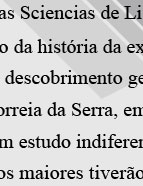

................................
The former argues that the study of the evolution of the Portuguese community can hardly be done without integrating it into the frameworks of international life, assigning diplomatic history a fundamental role through its sources and methodological possibilities for personalised inquiry, which goes beyond a purely sociological perspective to encompass the personal vision of interests and the problem of political decision-making. The latter considers Portuguese diplomacy from a geopolitical perspective, using the concept of a "situated nation" as a guide for a comparative history concerning the conditions and forms of survival of small states. It links foreign policy to the history of society as a whole, drawing attention to elites and the problem of political decision-making in the face of international conditions, domestic defence possibilities, and the collective ability for national cohesion and independence. José Calvet de Magalhães, an experienced diplomat, also published Breve História Diplomática de Portugal [A Brief Diplomatic History of Portugal] (1990).
The empirical-descriptive tools of traditional historiography, the emphasis on the state, and the power relations were insufficient to capture all aspects of reality, including the irrational and imaginary forces in decision-making processes. Political Science and Historical Anthropology gave the first signs of renewal. On the one hand, in the face of globalisation, there is a tendency to devalue the autonomy of the state. From a sociological perspective, analysis starts from the grassroots, examining the practices and symbolic repertoires of violence. From the standpoint of some transnationalist currents, the constitution and action of economic flows or ideological movements beyond the state are highlighted. On the other hand, Historical Anthropology also contributes to a re-evaluation of political action. Thus, diplomacy can be interpreted as a ritual practice, belonging to a system designed to give meaning to the relationship between states. While not denying the centrality of the state in diplomatic history and international relations, it is clear that although essential, it is not the only actor. Far from being homogeneous, it is underpinned by a series of interactions carried out by societies.
